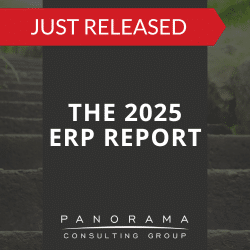In the professional services industry, both enterprise resource planning (ERP) systems and professional services automation (PSA) systems are crucial to enhancing operational efficiency. However, they each serve distinct needs and functions.
Today, we’re answering your ERP vs. PSA software questions. Keep reading for ERP vs. PSA software selection and vendor advice from the Panorama experts.
ERP vs. PSA: Functions and Benefits
ERP systems integrate various business functions into a unified system, including finance, human resources, project management, and more. These systems enable seamless information flow between departments, enhancing data accuracy and improving decision-making.
For example, an accounting firm might use an ERP system to integrate its financial management, client invoicing, and regulatory compliance processes. Some of the benefits of this approach would be timely identification of financial discrepancies, efficient allocation of funds, and adherence to financial regulations.
Many of the top ERP systems have project management capabilities. However, these capabilities are not necessarily robust when compared to PSA systems.
PSA platforms are designed specifically for project-based organizations. PSA systems tend to have stronger capabilities than ERP systems in areas such as skills tracking, project profitability tracking, and client self-service.
For instance, a marketing agency might implement a PSA system to manage client campaigns more effectively. By using cloud-based time and expense management functionality, the agency could optimize project timelines and budget allocation, improving client satisfaction.
2025 Clash of the Titans
SAP, Oracle, Microsoft, and Infor each have a variety of systems that can support data-driven decision-making. We surveyed customers of these four vendors to find out what their selection and implementation process was like.
What are Your Business Needs?
When our ERP consulting firm conducts software selections, we start by helping companies identify their current pain points and functional requirements. We also look at attributes such as their business model, industry requirements, operational complexity, and customization preferences.
As it relates to the choice between PSA and ERP, here’s what businesses should consider:
1. Business Model: Determine whether your business operates like a traditional company with multiple departments (better suited for ERP) or a project-based organization (better suited for PSA).
2. Industry Requirements: Consider the specific needs of your industry. Service-oriented businesses, such as consulting firms, might benefit more from PSA systems, while companies with broader operational requirements might find ERP systems more suitable.
3. Operational Complexity: Evaluate the complexity of your operations. If you require extensive integration across various functions, an ERP system might be the better choice. If your focus is more contained, you may only need to integrate project-related functions, so a PSA system might be more suitable.
4. Customization Preferences: How much customization are you comfortable with? An ERP system may require significant customization to meet the needs of a professional services firm. PSA systems typically require less customization and can integrate seamlessly with your existing software.
What About PSA and ERP Integration?
In some cases, businesses might benefit from integrating ERP and PSA software. This approach allows organizations to leverage the comprehensive capabilities of ERP solutions while taking advantage of the specialized project management features of PSA platforms.
Integration provides a holistic view of both operational and project-based activities. While the ERP manages financial and HR functions, the PSA solution manages the functions involved in client-facing projects.
For example, a large consulting firm with various internal departments might use ERP software for internal financial management, while using PSA tools for project-based resource allocation. Integrating these functions would allow the firm to align budget planning with resource availability and track project costs in real-time against financial forecasts.
Note: Not all ERP and PSA systems integrate seamlessly without additional customization or middleware. An ERP selection consultant can help you avoid this challenge by developing a comprehensive digital strategy that aligns with your long-term goals.
PSA vs. ERP: The Bottom Line
Choosing between an ERP vs. PSA software vendor is a critical decision that can impact your company’s operational efficiency and financial performance.
Whether you select just one of these systems or a combination of both, understanding your business requirements is essential. What are your current business processes? What kind of real-time data do you need?
Our ERP software consulting team can help you gather business requirements to ensure your new software meets your current and future needs.













